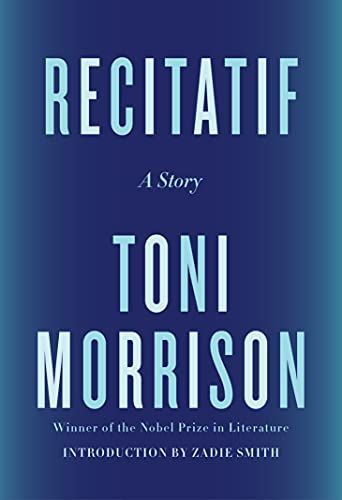
Recitatif A Story
A beautiful, arresting story about race and the relationships that shape us through life by the legendary Toni Morrison, in a stand-alone Knopf hardcover for the first time, with an introduction by Zadie Smith. In this 1983 short story--the only short story Morrison ever wrote--we meet Twyla and Roberta, who have known each other since they were eight years old and spent four months together as roommates in St. Bonaventure shelter. Inseparable then, they lose touch as they grow older, only later to find each other again at a diner, a grocery store, and again at a protest. Seemingly at opposite ends of every problem, and at each other's throats each time they meet, the two women still cannot deny the deep bond their shared experience has forged between them. Another work of genius by this masterly writer, Recitatif keeps Twyla's and Roberta's races ambiguous throughout the story. Morrison herself described Recitatif, a story which will keep readers thinking and discussing for years to come, as "an experiment in the removal of all racial codes from a narrative about two characters of different races for whom racial identity is crucial." We know that one is white and one is Black, but which is which? And who is right about the race of the woman the girls tormented at the orphanage? A remarkable look into what keeps us together and what keeps us apart, and how perceptions are made tangible by reality, Recitatif is a gift to readers in these changing times.
Reviews
Bethany Jenkins@bluepenguin17
Ester Waclavova@esterka
Maureen@bluereen
violeta@boynextdoor
farah farooq@farahjww
Charlsy Sekyere@charlsy_s
Ingelin@ingelin
rain/anagha@bookseoksoon
maggie petersen@maggiepetersen
Hannah Troy@hebaldwin1016
Leila@emailme
zoe@zzozo
Paige Wanner@turntopaige22
Haritlak Thawikasikam@haritread
Hannah VG@haenschen_klein
Suzanne@macaronouioui
Catherine Nicolai@cnic
Marion@mariorugu
Fatin Allen@fatinallen
Kelsey Wong@kelseywong
Lindsay@schnurln
Lea Rummel@lifemeetsliterature
Emily Burns@emilymelissabee
ineke@ineke
Highlights
Hannah VG@haenschen_klein
Page 84
Hannah VG@haenschen_klein
Page 77